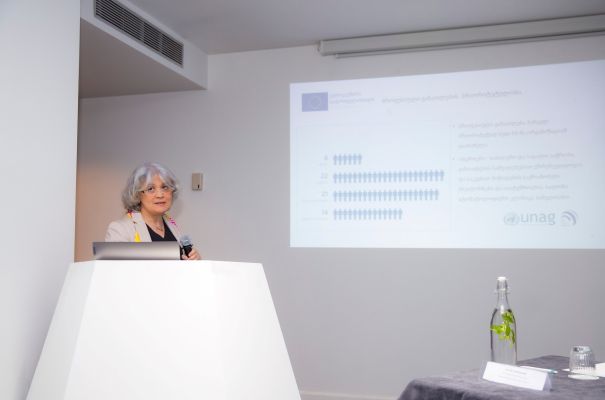EU Continues to Develop Skills in Georgia

Unemployment is one of the key problems Georgia is facing, with the country’s unemployment rate exceeding 20% in 2021, according to the National Statistics Service of Georgia.
Recent analysis of the national labour market by NSSG identified that the existing employment barriers faced by job seekers were the major objectives of several studies conducted within the EU’s Skills4Jobs initiative.
Seven partners came together to conduct a total of 12 separate research projects that fed into findings around employment and the labour market in Georgia. The labour market studies, that covered different target regions of Georgia, aimed at identifying professions in demand in a particular region and the possibility of creating short-term or long-term on-site vocational education and training (VET) courses.
Findings of the studies show that poor qualifications and insufficient work experience are among the main barriers for both employers and job seekers. In turn, these barriers are due to the lack of internship programmes in the regions. As shown by the studies, job seekers fail to adequately assess their own knowledge and skills, and have inflated expectations with regard to remuneration. Some young job seekers lack motivation. All these factors create additional barriers to employment.
Languages skills, especially sufficient command of English, are also poor. In Kvemo Kartli inadequate knowledge of the Georgian language was identified as a barrier to employment among national minorities, especially in the older age group.
For many years, the European Union has been actively involved in promoting employment and developing vocational education. Since 2008, it has been supporting VET reforms in the country, and since 2013 has been actively promoting a VET system that would meet the requirements of the labour market. The Skills4Jobs initiative is part of this process.
“The demand for vocational education is growing, although there is very little information about it in the private sector. Therefore, there is a need to establish direct links between the potential employer and institutions or organizations that offer VET support. We hope that the studies and discussions will help the Georgian government, educational institutions and the private sector, as well as the donor community, to determine what kind of interventions are needed to address these challenges together,” says Nino Kochishvili, Skills4Jobs Programme Coordinator at the EU Delegation to Georgia.
Several key public institutions are also involved in the process. The Ministry of Education and Science of Georgia notes that the European Union and its Skills4Jobs Programme play an important role in bringing the VET reform closer to EU standards and best practices.
“Empirical data, based on labour market needs, are important for planning the vocational education policy. The studies will help to draft the VET policy. I hope that educational institutions will take into account the findings and recommendations of the studies when implementing vocational programmes,” explains Natia Gvirjishvili, Deputy Head of the VET Department at the Ministry of Education and Science of Georgia. “The first strategy was drafted with the technical support of the European Union in the field of VET, as well as a new strategy for 2022 that is planned to be approved this year,” says Natia Gvirjishvili.
The completed studies have once again revealed a significant gap between the demand and supply of qualified personnel in the labour market. For example, while a large number of young people prefer to continue their education in universities after finishing school, most vacancies advertised by businesses are for candidates with secondary or vocational education.
The EU-funded studies have identified industries with growth potential and in-demand professions. According to the findings, there is a shortage of technical and industry-specific qualifications in the local labour market, and short-term programmes, that promote self-employment, are particularly popular. Job seekers are mostly interested in sectors that are characterised by an abundance of business entities and, therefore, high employment opportunities.
Sharing the main findings of the research conducted by the grant projects with a diverse audience is important in many ways. From now on, the representatives of the projects themselves have more complete information about the adjacent field of activity or the target region; This information will allow key state agencies, including the Ministry of Education and Science, to rely on multifaceted verified data when developing sectoral policies; For professional organizations, these studies are a valuable resource for working on reforms. And in general, this type of communication contributes to the deepening of cooperation between state agencies, the civil sector and the private sector in the field of professional education and employment.
About Skills4Jobs
The European Union has been supporting labour market reform and vocational education and training (VET) in Georgia for almost a decade. The first phase of the Skills4Jobs programme had resulted in the training of more than 750 vocational teachers, the development of 100 new courses and successful job placements for 30,000 people thanks to the programme.
The second phase, which was launched in 2018 aims to improve the employability of women, men, young people and vulnerable people in Tbilisi and regions of Georgia. The programme is implemented through a range of different measures. The total budget of the programme is EUR 48,85 million (approx. GEL 190 million) and includes budget support for the Georgian government, two institutional twinning projects, a grant scheme component, and a technical assistance project.
The new benchmarks the programme aims to achieve by 2023 includes helping at least 105,000 people into new jobs, with a focus on helping women, youth and the disadvantaged and an increase of 20 percent in the number of adult learners undertaking training or re-skilling.